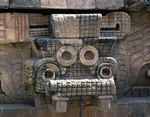There are numerous significant events that stand out from the era of discovery of the Americas. One event in particular is Hernando Cortés and his group of six hundred men conquering the Aztec Empire. One might ask how this conquest was possible? How was a small number of men able to conquer an entire empire? One factor that contributed to the Spanish conquest was the disease smallpox; however, there was another variable as well. The Aztec emperor Montezuma mistakenly believed Cortés to be Quetzalcoatl, an all powerful Aztec god who had promised one day to return to his people.1 So who was this supposed almighty god and why was Cortés believed to be him?

Quetzalcoatl, though most famously known for his relation to the Aztec religion, was actually acknowledged long before the Aztec civilization. Quetzalcoatl’s believers stretched all over Mesoamerica after the fall of Teotihuacan.2 Teotihuacan was a prehistoric city located in Central Mexico. The city arose around the first or second century BCE and fell around the 600s or 700s.3 The information regarding the civilization residing inside of Teotihuacan is still not fully known due to outside elements such as weather and other tribes who may have resided or passed through the area. The exact reason for the destruction of the city is still unknown. Although, archaeologists speculate the downfall was caused by a rapid decline in population.4 In accordance with Aztec legend, Quetzalcoatl had traveled from the east and elevated the Aztec empire by teaching them how to grow crops, develop architectural structures, and create tools with medal. He also helped construct the Aztec calendar. When an unknown rival tribe had surfaced, they drove Quetzalcoatl away. Before he left, Quetzalcoatl promised one day to return and save his oppressed people.5 Quetzalcoatl’s deity is represented as a feathered serpent.6 He was understood to be the god of learning and the patron of priests.7 Quetzalcoatl’s forthcoming was suspected to be around the same time as Cortés’ arrival.8

Scholars have attained an impressive amount of knowledge from ancient Aztec documents. According to their discoveries, the Aztecs proclaimed various omens of warning, which occurred just before the arrival of the conquistadors. Such omens included: an unusual amount of stars and comets in the sky, a sacred temple caught on fire, and the water on the lakes and rivers seeming to boil. All of these signs and the belief in the soon return of their god Quetzalcoatl, made it easy for the Aztecs to presume that Cortés was their long awaited god. Upon Cortés’ arrival, he was greeted with jewels and an assortment of gifts. When Cortés soon realized who the Aztecs deemed him to be and the influence his mistaken identity could produce, he was quick to use this opportunity to gain Montezuma’s trust, knowledge, resources, material objects, and even his fear. With their own emperor in a state of dismay, the rest of the Aztec people arose in a state of hysteria. This made it possible for Cortés and his men to manipulate the Aztecs, and profit from them what they wanted while they could. Eventually, Montezuma’s mistake led to the conquest of his entire empire.9
The Aztecs’ religious beliefs were fundamental attributes to their civilization. It was a unique quality which made them their own empire. In this particular circumstance, it was also a cause for their destruction. The Aztecs wholeheartedly believed their god Quetzalcoatl was partly responsible for the development of their civilization. Many Aztecs also truly believed Cortés was the return of their beloved god. Unfortunately for the Aztecs, their faith contributed to their conquest.
- Sara E. Cohen, “How the Aztecs Praised Montezuma,” Society for History Education 5, no. 3 (March 1972): 24-26. ↵
- Michael E. Smith, “Aztecs,” in The Oxford Handbook of the Archaeology of Ritual and Religion., by Rowan, Yorke M., ed. Timothy Insoll, vol. 77 (Arizona State Unversity, 2011), 563. ↵
- George L. Cowgill, “State and Society at Teotihuacan, Mexico,” Annual Review of Anthropology 26, no. 1 (October 1997): 129-130. ↵
- George L. Cowgill, “State and Society at Teotihuacan, Mexico,” 156. ↵
- Sara E. Cohen, “How the Aztecs Praised Montezuma,” 24-26. ↵
- Michael E. Smith, “Aztec Culture: An Overview” (Arizona State University, 2006), http://www.public.asu.edu/~mesmith9/1-CompleteSet/Smith-AztecCulture-WWW.pdf, 5. ↵
- Michael E. Smith, “Aztecs,” 563. ↵
- Sara E. Cohen, “How the Aztecs Praised Montezuma,” 24-26. ↵
- Sara E. Cohen, “How the Aztecs Praised Montezuma,” 24-26. ↵



65 comments
Madeline Chandler
Such an informative and interesting article! Very captivating. Honestly, I am vaguely familiar with the story of the Aztecs, Cortez, and their religion, yet I am not familiar with this story as in depth as this article. I think it is so interesting that the Aztecs thought Cortez was a specific deity called Quetzalcoatl. I am so curious now if Quetzalcoatl was actually real. Anyways, I think is so manipulative and oppressive that Cortez played the part just to gain trust then to conquer the Aztecs. I loved reading your article. Great job!
Ariette Aragon
For me the Pre-Columbian era is very interesting because I love to learn about my ancestors (indigenous groups like the Chorotegas from Nicaragua), their rich culture and long-lasting legacy. This situation actually happened in a lot of tribes in Mesoamerica, in which they mistook the colonizers as gods or as blessings sent to them. It was unfortunate that all these signs like the unusual amount of stars, were happening by the time Cortes arrived and that the Aztecs believed that he was the almighty Quetzalcoatl. Sadly, Cortes took advantage of this and saw the perfect opportunity to take this powerful empire. Ironic how their “god” that was supposed to save his people ended up being the reason of their fall.
Meadow Arriaga
This event is very interesting. The events worked out in Cortes’ favor for the Aztec people to mistake him for being Quetzalcoatl. The stars in the sky and the temple catching fire was all just mere coincidence upon Cortes’ arrival. In my opinion, Cortes took full advantage and that was not right. He used his power to eventually take over this empire and that was selfish.
Jose Chaman
I had never considered in this way the relationship between the Aztec religion and its decline as a society under the power of the conquerors. I find it really interesting how the Aztecs came to confuse Hernan Cortes as the very reincarnation of their god Quetzalcoatl. However, this is a fact that is not only reflected in the Aztec and Mesoamerica conquest. During the conquest of Tahuantinsuyo (what is now South America) most of the natives claimed that the Spanish presence was the consequence of the hate of the gods. Many of these civilizations developed efficiently through the institution of dogmas, since during the period of Inca expansion, one of the methods of submission was the adaptation of their beliefs, which were the veneration of the Sun god, and mixing them with the local religion.
Juan Arceo
This article is exactly why I love any story of a any tribe and well the Aztecs were no ordinary tribe. It is unfortunate that they misunderstood Cortez for the god Quetzalcoatl but who could blame them? Once you read the article you get to see the signs that were presented such as the rivers boiling, temples catching on fire, and more stars being shown in the sky so it was easy to envision Cortez as Quetzalcoatl and well that was their unfortunate demise of the Aztecs.
Kasandra Ramirez Ferrer
I grew up learning about Mexican history in school and this included learning about the ancient tribes once ruled Latin America until Hernan Cortes came and conquered what once was a barbaric country but with vast diversity. I do believe that some traditions from the tribes were very hideous that even the Spanish were disturbed by it, however, I do think that if Mexico hadn’t been conquered it would have eventually developed. Overcoming those wild traditions and become a society that was the center of trade and commerce, a society that would have different but marvelous advances today.
Vania Gonzalez
In most stories about the conquest of other civilizations I feel like it always has to do with faith and trust in the conquers. This is unfortunate because I feel like the Aztec empire could have kept going for a while if they had not been conquered or if they had defended themselves against Cortes and his men.
Yazmin Garza
What a terrible, terrible misunderstanding. Cortez was such a horrible person to take advantage of the Aztec people’s religious beliefs and stories. I hope the people of the Aztec empire understood that it was not Montezuma’s fault that they were taken advantage by the Spanish conquistadors. It is so sad that such a long-standing and powerful empire came to end because they were tricked into submission.
Engelbert Madrid
The history of Quetzalcoatl and his influence to the Aztec Empire is quite similar to the cartoon movie “The Road to El Dorado,” which two Spanish men are mistaken to be the gods of the Native Mexican civilization. In the case of the Aztec Empire, the Aztecs believed that Hernan Cortes was their god; unfortunately, Cortes took advantage of his “god power” and destroyed their civilization.
Michael Leary
Very interesting article. I remember learning parts of the this story before in middle school, but, not with all of the factors surrounding the situation. I found it interesting how the strange things happened right before Cortez and the Spaniards arrived, and found it very fortuitous for Cortez, because, his troops were outnumbered. It would not be fair to blame the Aztecs too much because they likely had not seen anyone so advanced in terms of weaponry and transportation.